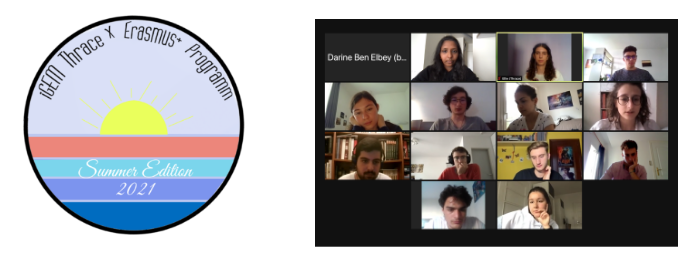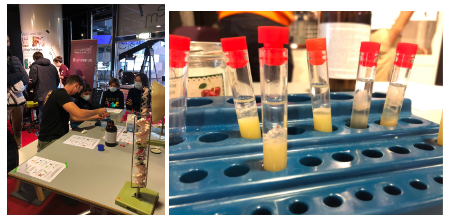Science Education
As biotech engineering students, we often face the challenge to vulgarize our work to make it accessible. Science is a vast area of topics, and it is crucial to diffuse knowledge to encourage people to take part in STEM and learn more.
Taking part in the iGEM competition allowed us to learn more about synthetic biology, and also enlightened us on the necessity to communicate with people about this topic, and about biology in general. However, we also noticed that the recent pandemic severely impacted the way science can be broadcasted.
We had opportunities to exchange with different kinds of people about science :
Erasmus Youth Exchange «Communicating Science to Non-Scientists»
This programme was launched by Team Thrace in Greece. It involved communicating science using non-typical forms of communication. This youth exchange programme united participants from France, Germany, Spain, Turkey and Greece. The programme dealt with science communication to a non-expert audience.

Why is science communication important in today’s world?
It can be difficult to communicate scientific topics to people without a scientific background. Nowadays, with the pandemic and the spread of fake news, it has become especially apparent how harmful ineffective science communication can be. That’s why learning and practicing science communication will help us communicate more efficiently in our careers as scientists.

Implementation
21 people from 5 different countries met in Alexandroupoli, Greece for the purpose of this programme. In late August, the participants had the chance to practice science communication through various means and show the end product to the local people of Alexandroupoli.
Participant Testimonials
Two members from our team took part in this exchange and below you'll find how they found the experience to be.
Arrya:
Through this exchange, I was able to learn and experience different ways of communicating science to non-scientific audiences. I believe that together with everyone we were able to convey our message of helping the audience understand what synthetic biology is and its importance. In the end, it was a huge success and I am grateful to iGEM Thrace and Erasmus for providing us the opportunity to come together and have such a wonderful experience.

Viktoriia:
For me it was an incredible and very insightful experience of communicating with people from different countries in a very productive and fun way. Working together for 7 days we have managed to write a theater play which represents 3 actual topics in the scientific world: climate change, vaccination and synthetic biology.
We performed our theater play in front of the Greek public and our efforts to deliver complex scientific topics to the general listener have been successful. Based on the feedback that we got from our audience we have successfully explained all 3 subjects in a very entertaining and comprehensive way. For sure, it was a great opportunity for our team to participate in that Youth Exchange and we are grateful to iGEM Thrace for organising it.
Looking forward to repeating this Exchange and learning about science communication even more!
In a nutshell...
We spent 7 joyful and interesting days all together. Each day, we worked on composing the theater play, rehearsing and crafting materials. Moreover, we organized cultural evenings, where we shared cultural differences, presented food specific to our country and sometimes showed dances typical for the culture as well. It was very fun and we learned a lot from that experience.
During this productive and fruitful exchange we have learned to run brainstorming sessions, communicate our ideas clearly, actively listen to others and more importantly: to communicate science in an entertaining way!
During our brainstorming sessions we discussed different actual topics in the scientific world, and exchanged our opinions and ideas about the ways to communicate them to the general public. We acquired skills in theater play. All of it to become better in science communication without words. This is particularly helpful to communicate between different cultures with different languages. And finally, we managed to make a nice theater play with 3 acts and successfully performed it in front of the general public, which appreciated it a lot.
After returning home, we collaborated with fellow participants from iGEM Sorbonne to create a video on the theme of climate change in order to put what we learned during the program into practice and bring more awareness to the issue.
French Meet-Up
The French Meet-Up was organised among the 9 french teams taking part in the iGEM competition. You can find more information about the organization of this event in the Collaboration part of the wiki.
Our goal with this event was to present the french teams and find interesting workshops for the other iGEM Teams.
We hosted 3 workshops, one by Patrick Torbey (co-founder of Neoplants) who talked about how he uses synthetic biology to modify plants to fight air pollution. There was another workshop by Elodie Chabrol, who is a freelance science communicator. She explained how to properly do science communication to make this discipline accessible to everyone. The last workshop was held by Manish Kushwaha, researcher in synthetic biology at the Micalis Institute. Manish presented his work on biological cell-free circuits and their various applications. It was very interesting to find speakers to make our meet-up more stimulating for the other teams, we learned more about science communication and how to choose speakers adapted to our audience.
All the French teams presented their projects. This exercise was a great way to summarize our projects to a scientific audience. We also learned a lot about the other projects and new techniques. This allowed us to communicate with the other teams on similar techniques, and get used to answering scientific questions about our project.

iGEM Week
To stimulate the interest in synthetic biology of the students from our school, we organized an iGEM Week. The aim was to present the iGEM competition to the other students and help them gain interest in synthetic biology. Our school specializes in biotech engineering, therefore the students already have a scientific background.
We organized 2 presentations by former iGEM participants in the IONIS Paris team. The first one was Paul Lubrano : Paul participated in the 2017 iGEM competition. He now works on his PhD in Germany and studies antibiotics resistance and Escherichia coli metabolism. He presented an article about “Conversion of Escherichia coli to generate all biomass carbon from CO2.”
The other speaker was one of our advisors, Matthieu Da Costa. Matthieu took part in both the 2014 and 2015 iGEM competitions, for 2 different teams. He founded the IONIS Paris team in 2016. He is now working on his PhD in Belgium on biocatalysis and enzyme engineering. He presented his work on enzymes during the iGEM week.

Both of these presentations attracted mostly last-year students. The topics were complex, but accessible to students with a basic biology training. The format was maybe the limiting factor. Due to the sanitary crisis, the use of online tools adapted to conferences has increased tremendously, which allows to connect with speakers from all around the world. However, this new habit of communicating has also impacted students who had the better part of their courses done online. This has an influence on how students consume scientific communication. We didn’t have the opportunity to organise these conferences in physical conditions, but this could have potentially helped gain the interest of more students.
We also organized an afterwork, with more than 150 participants, to exchange about science in a more friendly atmosphere.
Cité des sciences et de l'Industrie
The “Cité des sciences et de l’Industrie” is the biggest science museum in Europe. It is located in Paris. Together with the other 5 Parisian teams (Team GO Paris-Saclay, Team Sorbonne U Paris, Team Evry Paris-Saclay, Team Paris Bettencourt, Team UParis BME) we had the opportunity to host a booth and organize conferences during a weekend in October. This took place during the “Fête de la Science”, a french annual event to stimulate interest in STEM in young people. Our audience was children with ages ranging from 6 to 12 years old, but also some adults.
We held a booth with a kiwi DNA extraction activity. We explained what DNA is to the children and extracted the DNA according to this protocol. During the whole weekend, we met with children of all ages (and also adults !) to do this playful activity. We found that by directly involving participants, they were much more keen on learning about DNA and biology. As this activity is done with basic ingredients (dish soap, salt, etc.), participants expressed the interest to do it again at home.

We also made presentations about synthetic biology and we presented our project throughout the whole weekend. We had to adapt our presentations to an audience with little knowledge in biology. We explained key principles like DNA, cellular processes and so on.

Moreover, we created a small game linked to our project. We decided to cover a larger topic than just B12. We created a matching-pairs card game on vitamins. We focused on the main groups of vitamins, A B C D and E. We provided information on vitamins (where to find them, their role, etc.) during the game and finished with a Kahoot quiz to test the knowledge retained by the participants

Workshop with primary school pupils
We had the opportunity to visit a primary school to speak with one class about DNA. We met with children in third grade. We first presented them a few slides explaining broadly the concept of DNA and we answered their (many) questions. After that, we once again did a DNA extraction on pieces of banana. The children already had quite good notions on biology and were very interested in the topic.

Vitamin Cookbook
More specifically than spreading knowledge about our synthetic biology, we thought about our project’s scope and decided we wanted to raise awareness about the importance of vitamins for health. As you can see in the Collaboration part, we teamed up with teams TU Delft and Northern BC, who also work on vitamins, to create a Vitamin Cookbook. The goal was to give general information about each vitamins (role, daily doses, etc.) and give some recipes to have a balanced diet.
You can find the cookbook here.
